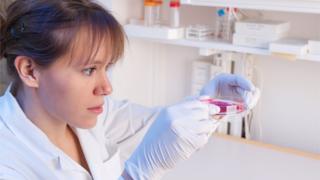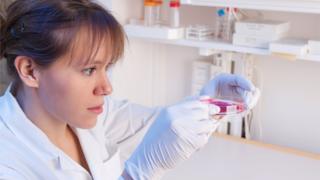The risks behind the hype of stem-cell treatments
A BBC investigation finds many of the therapies at private clinics are unproven and unregulated. …

 Image copyright Getty Images
Image copyright Getty Images Some private clinics are charging UK patients thousands of pounds for unproven and unregulated treatments using the “healing powers” of stem cells, the BBC has found.
And experts are warning some of these “therapies” can cause significant harm.
Stem cells can become many types of cells in the body, from muscle to brain, and can repair damaged tissue.
But they are approved only for treating some blood conditions, for skin grafts and the repair of damaged corneas.
There is growing evidence stem cells may help other conditions, including multiple sclerosis – but only after full clinical trials can these procedures be declared safe, effective and better than existing treatments.
Until then, they are experimental.
‘Horrified’
The Autism Regenerative Centre, in London, however, is currently offering stem-cell treatments for autism for children over the age of two.
Bone marrow cells are taken from the child under general anaesthetic and re-injected into a vein or their spinal canal, according to its website.
Up to three treatments, each costing £9,500, may be prescribed.
And, an ARC manager told a UK mother, the procedure could be carried out at a hospital near Harley Street very soon.
But Prof Declan Murphy, a leading figure in autism research, at King’s College London, said he was horrified such treatment was being offered, because there was “no evidence it was reliable or safe”.
The ARC did not respond to requests for an interview.
Tough action
If someone’s own cells are removed and re-injected into their body without being substantially changed, the process falls outside usual EU legal regulation.
But the Department of Health said the Medicines and Healthcare Products Regulatory Agency would take tough action against any clinic not following strict safety rules.
There is also growing concern among experts about the rapidly expanding private sector offering stem-cell and regenerative therapies to treat arthritis and joint problems.
And a number of clinicians and researchers told BBC Radio 4’s Stem Cell Hard Sell programme the treatments could not be justified by the quality of evidence.
‘Vested interest’
More than 70 private providers in the UK offer stem-cell treatments for painful joints.
Cell material is removed from the patient’s bone marrow or body fat and re-injected into the joint.
But hip and knee surgeon Prof Fares Haddad, from University College Hospitals, London, editor-in-chief of the Bone and Joint Journal, told the BBC there was “no evidence base” for the treatments, just “a sham scientific legitimacy” created by those who have “a vested interest in selling these services”.
And he had personally treated three patients harmed by these private stem-cell injections.
One had had a severe infection and the other two had developed potentially lethal blood clots.
In the US, meanwhile, there have been dozens of documented cases where patients have been seriously harmed by stem cell therapies.
Botched injection
Prof Megan Munsie, from the University of Melbourne, who chairs the International Society for Stem Cell Research’s ethics committee, said it was unclear whether these unproven treatments, which “quite frankly are flooding the marketplace”, were harming patients or had “any benefit whatsoever'”.
Several sources told the BBC about a woman blinded in one eye by a botched injection of fat cells into her jaw joint, at the Regenerative Clinic, in London.
Chief executive Simon Checkley told the BBC the Care Quality Commission report showed “emergency action had been taken immediately and the incident had been managed effectively”.
But the report, which rates the clinic as “good”, also shows it had not been reported to the regulator at the time because of “an oversight” on the part of the clinic.
“For legal and ethical reasons, I can’t comment on individual cases,” Mr Checkley told the BBC
“I can say, though, that we take every complication very seriously.
“Now, we’ve only we’ve only had one complication in 1,700 cases.”
Stem Cell Hard Sell is on BBC Radio 4 at 20:00 on Tuesday, 7 January ,and 17:00 on Sunday, 12 January.

